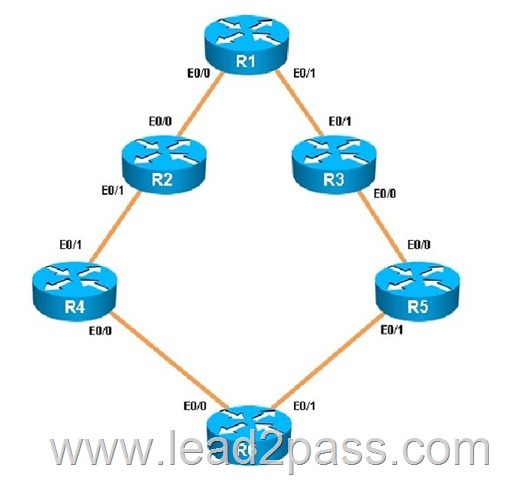2016 October Cisco Official New Released 300-135 Dumps in Lead2pass.com!
100% Free Download! 100% Pass Guaranteed!
Are you worring about the 300-135 exam? With the complete collection of 300-135 exam questions and answers, Lead2pass has assembled to take you through your 300-135 exam preparation. Each Q & A set will test your existing knowledge of 300-135 fundamentals, and offer you the latest training products that guarantee you passing 300-135 exam easily.
Following questions and answers are all new published by Cisco Official Exam Center: http://www.lead2pass.com/300-135.html
QUESTION 31
You have been brought in to troubleshoot an EIGRP network. A network engineer has made configuration changes to the network rendering some locations unreachable. You are to locate the problem and suggest solution to resolve the issue.
R5 has become partially isolated from the remainder of the network. R5 can reach devices on directly connected networks but nothing else. What is causing the problem?
A. An outbound distribute list in R3
B. Inbound distribute lists in R5
C. An outbound distribute list in R6
D. Incorrect EIGRP routing process ID in R5
Answer: B
Explanation:
Here we see that distribute list 3 has been applied to EIGRP on router R%, but access-list 3 contains only deny statements so this will effectively block all routing advertisements from its two EIGRP neighbors, thus isolating R5 from the rest of the EIGRP network:
QUESTION 32
Scenario:
You have been brought in to troubleshoot an EIGRP network. You have resolved the initial issue between routers R2 and R4, but another issue remains. You are to locate the problem and suggest solution to resolve the issue.
The customer has disabled access to the show running-config command. 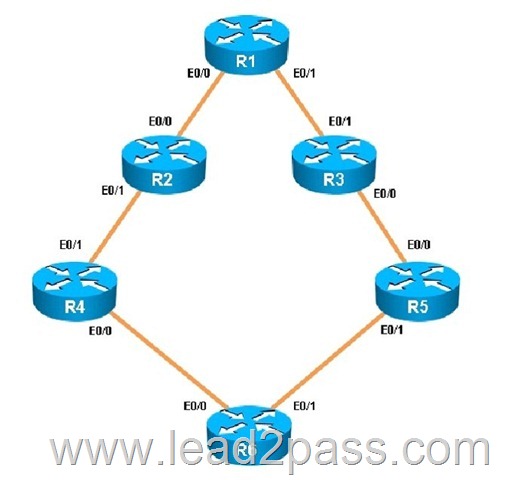
The network segment between R2 and R4 has become disconnected from the remainder of the network. How should this issue be resolved?
A. Change the autonomous system number in the remainder of the network to be consistent with R2 and R4.
B. Move the 192.168.24.0 network to the EIGRP 1 routing process in R2 and R4.
C. Enable the R2 and R4 router interfaces connected to the 192.168.24.0 network.
D. Remove the distribute-list command from the EIGRP 200 routing process in R2.
E. Remove the distribute-list command from the EIGRP 100 routing process in R2.
Answer: B
Explanation:
When issuing the “show ip eigrp neighbor” command (which is about the only command that it lets you do in this question) you will see that all other routers are configured for EIGRP AS 1. However, the 192.16824.0 network between R2 and R4 is incorrectly configured for EIGRP AS 100:
QUESTION 33
Scenario:
You have been asked by your customer to help resolve issues in their routed network. Their network engineer has deployed HSRP. On closer inspection HSRP doesn’t appear to be operating properly and it appears there are other network problems as well. You are to provide solutions to all the network problems.
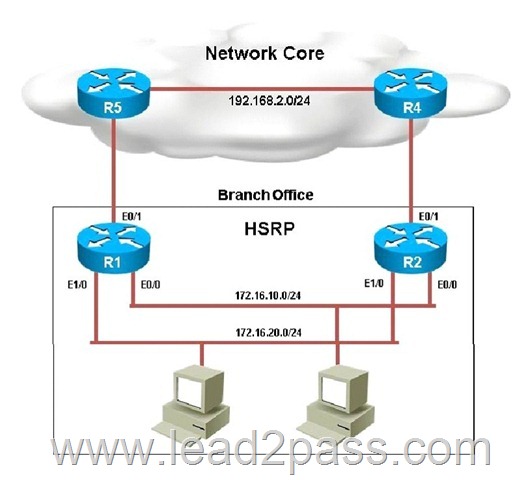
You have received notification from network monitoring system that link between R1 and R5 is down and you noticed that the active router for HSRP group 1 has not failed over to the standby router for group 1. You are required to troubleshoot and identify the issue.
A. There is an HSRP group track command misconfiguration
B. There is an HSRP group priority misconfiguration
C. There is an HSRP authentication misconfiguration
D. There is an HSRP group number mismatch
E. This is not an HSRP issue; this i routing issue.
Answer: A
Explanation:
When looking at the HSRP configuration of R1, we see that tracking has been enabled, but that it is not tracking the link to R5, only the link to R2:
R1 should be tracking the Eth 0/1 link, not 0/0 to achieve the desired affect/
QUESTION 34
Scenario:
You have been asked by your customer to help resolve issues in their routed network. Their network engineer has deployed HSRP. On closer inspection HSRP doesn’t appear to be operating properly and it appears there are other network problems as well. You are to provide solutions to all the network problems. 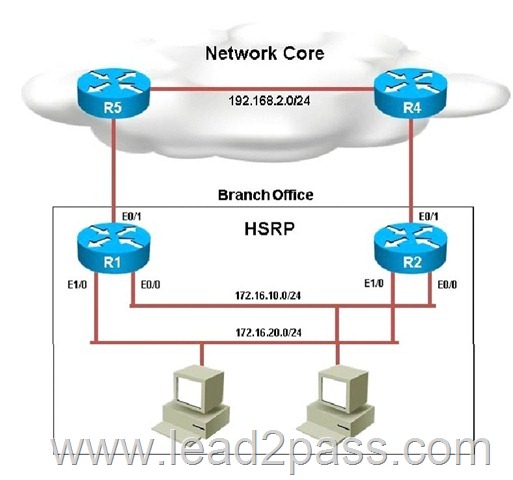
The following debug messages are noticed for HSRP group 2. But still neither R1 nor
R2 has identified one of them as standby router. Identify the reason causing the
issue.
Note: only show commands can be used to troubleshoot the ticket.
R1#
‘Mar 26 11:17:39.234: HSRP: Et1/0 Grp 2 Hello out 172.16.20.2 Active pri 100 vIP
172.16.20.254
‘Mar 26 11:17:40.034: HSRP: EtO/0 Grp 1 Hello out 172.16.10.2 Active prj 130 vIP
172.16.10.254
R1#
‘Mar 26 11:17:40.364: HSRP: EtO/0 Grp 1 Hello in 172.16.10.1 Standby pri 100 vIP
172.16.10.254
R1#
‘Mar 26 11:17:41.969: HSRP: Et1/0 Grp 2 Hello out 172.16.20.2 Active pri 100 vIP
172.16.20.254
‘Mar 26 11:17:42.719: HSRP: EtO/0 Grp 1 Hello out 172.16.10.2 Active prj 130 vIP
172.16.10.254
‘Mar 26 11:17:42.918: HSRP: EtO/0 Grp 1 Hello in 172.16.10.1 Standby pri 100 vIP
172.16.10.254
R1#
‘Mar 26 11:17:44.869: HSRP: Et1/0 Grp 2 Hello out 172.16.20.2 Active pri 100 vIP
172.16.20.254
‘Mar 26 11:17:45.485: HSRP: EtO/0 Grp 1 Hello out 172.16.10.2 Active prj 130 vIP
172.16.10.254
‘Mar 26 11:17:45.718: HSRP: EtO/0 Grp 1 Hello in 172.16.10.1 Standby pri 100 vIP
172.16.10.254
R1#
‘Mar 26 11:17:47.439: HSRP: Et1/0 Grp 2 Hello out 172.16.20.2 Active pri 100 vIP
172.16.20.254
‘Mar 26 11:17:48.252: HSRP: EtO/0 Grp 1 Hello in 172.16.10.1 Standby pri 100 vIP
172.16.10.254
‘Mar 26 11:17:48.322: HSRP: EtO/0 Grp 1 Hello out 172.16.10.2 Active prj 130 vIP
172.16.10.254
R1#
‘Mar 26 11:17:50.389: HSRP: Et1/0 Grp 2 Hello out 172.16.20.2 Active pri 100 vIP
172.16.20.254
‘Mar 26 11:17:50.735: HSRP: EtO/0 Grp 1 Hello in 172.16.10.1 Standby pri 100 vIP
172.16.10.254
‘Mar 26 11:17:50.921: HSRP: EtO/0 Grp 1 Hello out 172.16.10.2 Active prj 130 vIP
172.16.10.254
R1#
‘Mar 26 11:17:53.089: HSRP: Et1/0 Grp2 Hello out 172.16.20.2 Active pri 100 vIP
172.16.20.254
‘Mar 26 11:17:53.338: HSRP: EtO/0 Grp 1 Hello out 172.16.10.2 Active pri130vlP
172.16.10.254
‘Mar 26 11:17:53.633: HSRP: EtO/0 Grp 1 Hello in 172.16.10.1 Standby pri 100 vIP
172.16.10.254
A. HSRP group priority misconfiguration
B. There is an HSRP authentication misconfiguration
C. There is an HSRP group number mismatch
D. This is not an HSRP issue: this is DHCP issue.
E. The ACL applied to interface is blocking HSRP hello packet exchange
Answer: E
Explanation:
On R1 we see that access list 102 has been applied to the Ethernet 1/0 interface:
This access list is blocking all traffic to the 224.0.0.102 IP address, which is the multicast address used by HSRP.
QUESTION 35
Scenario:
You have been asked by your customer to help resolve issues in their routed network. Their network engineer has deployed HSRP. On closer inspection HSRP doesn’t appear to be operating properly and it appears there are other network problems as well. You are to provide solutions to all the network problems. 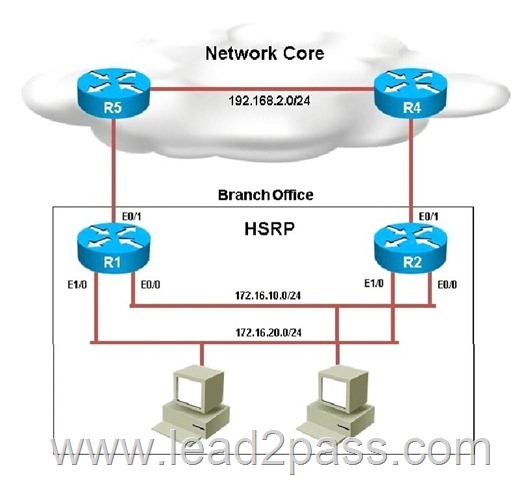
Examine the configuration on R4. The routing table shows no entries for 172.16.10.0/24 and 172.16.20.0/24. Identify which of the following is the issue preventing route entries being installed on R4 routing table?
A. HSRP issue between R4 and R2
B. This is an OSPF issue between R4 and R2
C. This is a DHCP issue between R4 and R2
D. The distribute-list configured on R4 is blocking route entries
E. The ACL configured on R4 is blocking inbound traffic on the interface connected to R2
Answer: D
Explanation:
If we look at the configuration on R4 we see that there is a distribute list applied to OSPF, which blocks the 172.16.20.0/24 and 172.16.10.0/24 networks.
QUESTION 36
Scenario:
You have been asked by your customer to help resolve issues in their routed network. Their network engineer has deployed HSRP. On closer inspection HSRP doesn’t appear to be operating properly and it appears there are other network problems as well. You are to provide solutions to all the network problems. 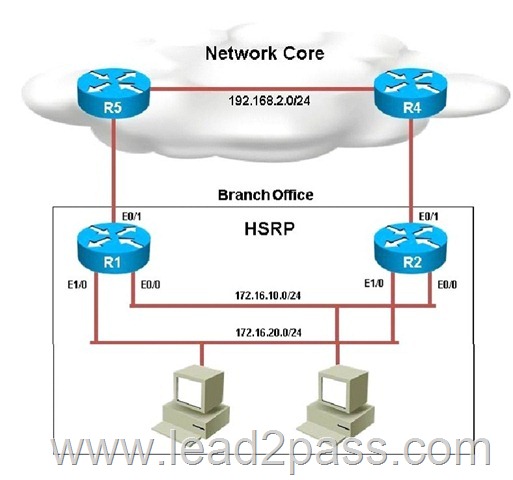
Examine the configuration on R5. Router R5 do not see any route entries learned from R4; what could be the issue?
A. HSRP issue between R5 and R4
B. There is an OSPF issue between R5and R4
C. There is a DHCP issue between R5 and R4
D. The distribute-list configured on R5 is blocking route entries
E. The ACL configured on R5 is blocking traffic for the subnets advertised from R4.
Answer: B
Explanation:
If we issue the “show ip route” and “show ip ospf neighbor” commands on R5, we see that there are no learned OSPF routes and he has no OSPF neighbors.
QUESTION 37
Scenario:
A customer network engineer has edited their OSPF network configuration and now your customer is experiencing network issues. They have contacted you to resolve the issues and return the network to full functionality. 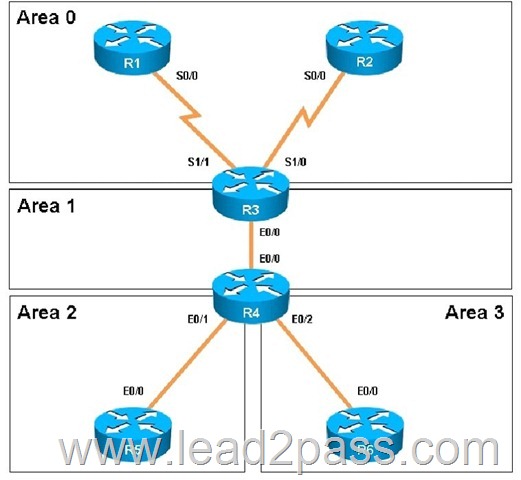
The OSPF neighbour relationship has been lost between R1 and R3.
What is causing this problem?
A. The serial interface in R1 should be taken out of the shutdown state.
B. A neighbor statement needs to be configured in R1 and R3 pointing at each other.
C. The R1 network type should be changed to point-to-multipoint non-broadcast.
D. The hello, dead and wait timers on R1 need to be reconfigured to match the values on R3.
Answer: C
Explanation:
In order for two OSPF routers to become neighbors, they must have matching network types across the links. In this case, we see that R1 has been configured as non-broadcast and R3 is using point to point non-broadcast.
This can be seen by issuing the “show running-config” command on each router, or the “show ip ospf interface” command:
QUESTION 38
Scenario:
A customer network engineer has edited their OSPF network configuration and now your customer is experiencing network issues. They have contacted you to resolve the issues and return the network to full functionality. 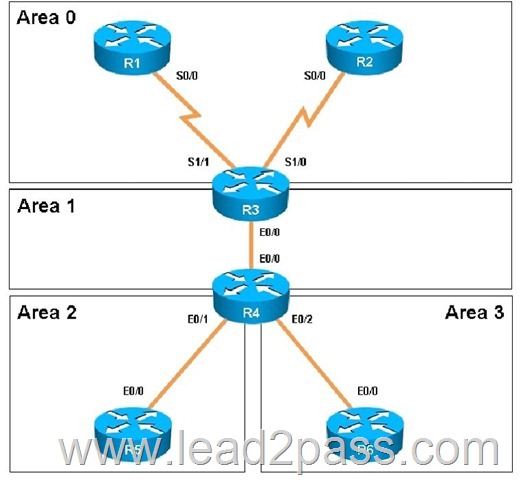
Connectivity from R3 to R4, R5 and R6 has been lost. How should connectivity be reestablished?
A. Configure R4 with a virtual link to 192.168.13.2
B. Change the R3 and R4 hello-interval and retransmit-interface timers to zero so the link won’t go down.
C. Add an OSPF network statement for 4.4.4.4 0.0.0.0 area 1 in R3
D. Add an OSPF network statement for 192.168.34.3 0.0.0.255 area 2 in R3
E. Add an OSPF network statement for 192.168.34.0 0.0.0.255 area 1 in R3
Answer: E
Explanation:
Based on the network diagram, we know that a virtual link will need to be configured to logically connect area 2 to the back area 0. However, this is not the problem as we can see that R3 has been correctly configured to do this. It is, however, missing the network statement for the link to R4.
Here, we see that the link to R4 is using the 192.168.34.0 network, but that this network has not been added to OSPF
Based on the network diagram, this link should be added to Area 1, not Area 2.
QUESTION 39
Scenario:
A customer network engineer has edited their OSPF network configuration and now your customer is experiencing network issues. They have contacted you to resolve the issues and return the network to full functionality. 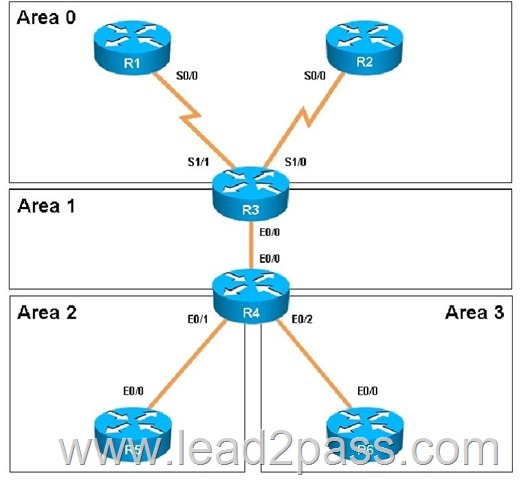
After resolving the issues between R3 and R4. Area 2 is still experiencing routing issues. Based on the current router configurations, what needs to be resolved for routes to the networks behind R5 to be seen in the company intranet?
A. Configure R4 and R5 to use MD5 authentication on the Ethernet interfaces that connect to the common subnet.
B. Configure Area 1 in both R4 and R5 to use MD5 authentication.
C. Add ip ospf authentication-key 7 BEST to the R4 Ethernet interface that connects to R5 and ip ospf authentication-key 7 BEST to R5 Ethernet interface that connects to R4.
D. Add ip ospf authentication-key CISCO to R4 Ethernet 0/1 and add area 2 authentication to the R4 OSPF routing process.
Answer: D
Explanation:
Here, we see from the running configuration of R5 that OSPF authentication has been configured on the link to R4:
However, this has not been done on the link to R5 on R4:
QUESTION 40
Scenario:
A customer network engineer has edited their OSPF network configuration and now your customer is experiencing network issues. They have contacted you to resolve the issues and return the network to full functionality. 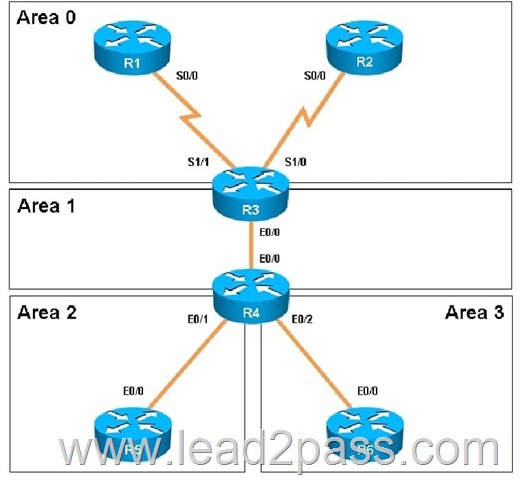
The 6.6.0.0 subnets are not reachable from R4. how should the problem be resolved?
A. Edit access-list 46 in R6 to permit all the 6.6.0.0 subnets
B. Apply access-list 46 in R6 to a different interface
C. Apply access-list 1 as a distribute-list out under router ospf 100 in R4
D. Remove distribute-list 64 out on R6
E. Remove distribute-list 1 in ethernet 0/1 in R4
F. Remove distribute-list 1 in ethernet 0/0 in R4
Answer: D
Explanation:
Here we see from the running configuration of R6 that distribute list 64 is being used in the outbound direction to all OSPF neighbors.
However, no packets will match the 6.6.0.0 in this access list because the first line blocks all 6.0.0.0 networks, and since the 6.6.0.0 networks will also match the first line of this ACL, these OSPF networks will not be advertised because they are first denied in the first line of the ACL.
Trouble Ticket (14 TT Questions and Answers) 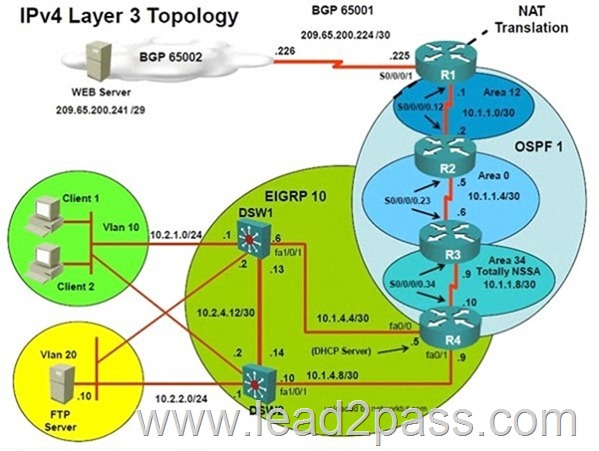
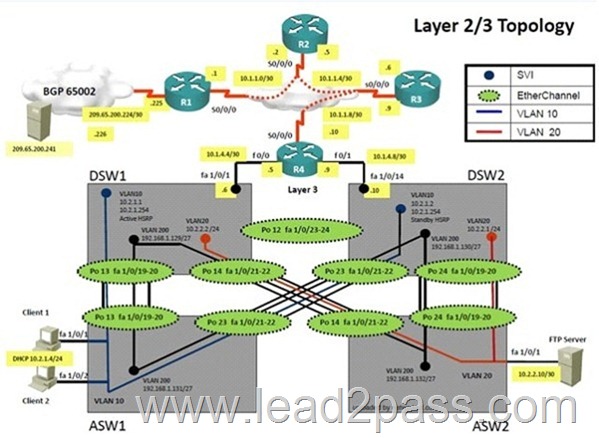
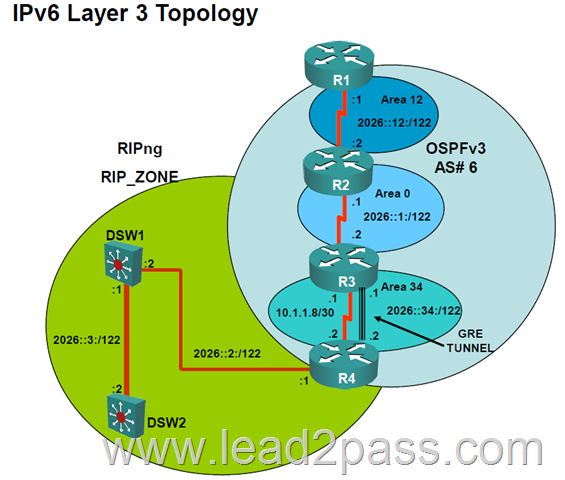
Ticket 1 : Switch Port Trunk
Topology Overview (Actual Troubleshooting lab design is for below network design)
– Client Should have IP 10.2.1.3
– EIGRP 100 is running between switch DSW1 & DSW2
– OSPF (Process ID 1) is running between R1, R2, R3, R4
– Network of OSPF is redistributed in EIGRP
– BGP 65001 is configured on R1 with Webserver cloud AS 65002
– HSRP is running between DSW1 & DSW2 Switches
The company has created the test bed shown in the layer 2 and layer 3 topology exhibits.
This network consists of four routers, two layer 3 switches and two layer 2 switches.
In the IPv4 layer 3 topology, R1, R2, R3, and R4 are running OSPF with an OSPF process number 1.
DSW1, DSW2 and R4 are running EIGRP with an AS of 10. Redistribution is enabled where necessary.
R1 is running a BGP AS with a number of 65001. This AS has an eBGP connection to AS 65002 in the ISP’s network. Because the company’s address space is in the private range.
R1 is also providing NAT translations between the inside (10.1.0.0/16 & 10.2.0.0/16) networks and outside (209.65.0.0/24) network.
ASW1 and ASW2 are layer 2 switches.
NTP is enabled on all devices with 209.65.200.226 serving as the master clock source.
The client workstations receive their IP address and default gateway via R4’s DHCP server.
The default gateway address of 10.2.1.254 is the IP address of HSRP group 10 which is running on DSW1 and DSW2.
In the IPv6 layer 3 topology R1, R2, and R3 are running OSPFv3 with an OSPF process number 6.
DSW1, DSW2 and R4 are running RIPng process name RIP_ZONE.
The two IPv6 routing domains, OSPF 6 and RIPng are connected via GRE tunnel running over the underlying IPv4 OSPF domain. Redistrution is enabled where necessary.
Recently the implementation group has been using the test bed to do a `proof-of-concept’ on several implementations. This involved changing the configuration on one or more of the devices. You will be presented with a series of trouble tickets related to issues introduced during these configurations.
Note: Although trouble tickets have many similar fault indications, each ticket has its own issue and solution.
Each ticket has 3 sub questions that need to be answered & topology remains same.
Question-1 Fault is found on which device,
Question-2 Fault condition is related to,
Question-3 What exact problem is seen & what needs to be done for solution
Client is unable to ping IP 209.65.200.241
Solution:
Steps need to follow as below:
– When we check on client 1 & Client 2 desktop we are not receiving DHCP address from R4
Ipconfig —– Client will be getting 169.X.X.X
– On ASW1 port Fa1/0/ 1 & Fa1/0/2 access port VLAN 10 was assigned which is using IP address 10.2.1.0/24
Sh run ——- & check for running config of int fa1/0/1 & fa1/0/2
====================================================
interface FastEthernet1/0/1 switchport mode access switchport access vlan 10
interface FastEthernet1/0/2 switchport mode access switchport access vlan 10
====================================================
– We need to check on ASW 1 trunk port the trunk Po13 & Po23 were receiving VLAN 20 & 200 but not VLAN 10 so that switch could not get DHCP IP address and was failing to reach IP address of Internet 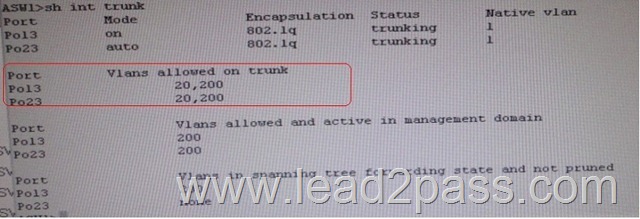
– Change required: On ASW1 below change is required for switch-to-switch connectivity..
int range portchannel13,portchannel23 switchport trunk allowed vlan none switchport trunk allowed vlan 10,200
At Lead2pass, we are positive that our Cisco 300-135 dumps with questions and answers PDF provide most in-depth solutions for individuals that are preparing for the Cisco 300-135 exam. Our updated 300-135 braindumps will allow you the opportunity to know exactly what to expect on the exam day and ensure that you can pass the exam beyond any doubt.
300-135 new questions on Google Drive: https://drive.google.com/open?id=0B3Syig5i8gpDMVBfSHZ4UzJTOVk
2016 Cisco 300-135 exam dumps (All 87 Q&As) from Lead2pass:
http://www.lead2pass.com/300-135.html [100% Exam Pass Guaranteed]
